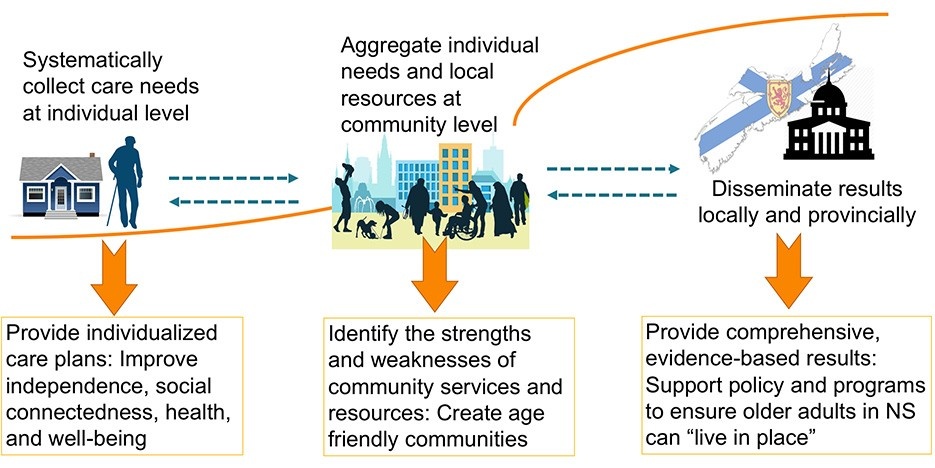ACTing Collectively
ACTing Collectively to map and address the needs of community-living older adults in Nova Scotia.

Principal Investigators:
Dr. Tanya Packer (Professor, Dalhousie University)
Dr. Grace Warner (NSH Affiliate Scientist; Professor at Dalhousie University)
Co- Investigators:
Beverley Lawson (Capacity Development Officer, BRIC NS; Senior Research Associate, Dalhousie University)
Dr. Susan Kirkland (Professor, Dalhousie University)
Dr. Elaine Moody (NSH Affiliate Scientist; Assistant Professor, Dalhousie University)
Dr. Sorayya Askari (NSH Affiliate Scientist; Assistant Professor, Dalhousie University)
Dr. Parisa Ghanouni (Assistant Professor, Dalhousie University)
Dr. Yu-Ting Chen (Postdoctoral Fellow, Dalhousie University)
Erin Christian (Implementation Director, PHC-NSH)
Sarah Manley (Operations Consultant, PHC-NSH)
Jacqueline Campbell (Community Development Officer, Home and Community Care, Nova Scotia Department of Seniors and Long-Term Care)
Janet Simm (President and CEO, Northwood Corporate)
Margaret Szabo (Research Coordinator, Dalhousie University; Citizen Partner)
Ron Swan (Chair, C.A.R.P. Nova Scotia Chapter)
Wider Team: Brianna Wolfe (Research Coordinator), Bryah Boutilier (Research Assistant)
Funding: This project is funded by the Nova Scotia Research Fund ($99,308; 2021-2024) and Department of Seniors and Long-Term Care ($517,500; 2022-2025)
Listen to the CBC Cape Breton interview about this project (8 minutes):
https://www.cbc.ca/listen/live-radio/1-24/clip/15900884
Project Partners:
Project Summary:
Community-level data is needed to evaluate and monitor the health and wellbeing of aging adults and the communities in which they live. This is critical for developing policies and programs that support aging well in communities. The ACTing Collectively research project will pilot an innovative approach to gathering data on the needs of, and available resources for, community-living older adults to age well in communities. The project’s focus on aging well in communities addresses the Nova Scotia Health Research Fund priority of aging and continuing care, and supports Nova Scotia Health’s strategic vision of Healthy people, healthy communities – for generations. This project also aligns with Department of Seniors and Long-Term Care’s Age-Friendly Communities Initiative, which aims to help Nova Scotians stay active, healthy, and engaged in communities.
Our Vision

The evidence-based innovation is called Age Care Technology (ACTTM). The ACTTM is a set of integrated tools used to 1) assess the needs of older adults and provide them with an individualized report linked to a list of related community resources, and 2) connect to a global database that tracks intervention outcomes and trajectories in aging adults’ wellbeing, independence, social connection and health in other locations. A unique aspect of this project will be the design and creation of Community Profile Reports, intended to inform local policy makers and planners about the specific needs of their communities.
The ACTing Collectively research project is founded on a collaborative partnership between Nova Scotia Health (NSH),the Department of Seniors and Long-Term Care, Northwood Corporate, the Canadian Association of Retired Persons (C.A.R.P.) Nova Scotia Chapter, and Dalhousie University researchers. The overall objective is to assess the usefulness and feasibility of implementing the ACTTM. The team will trial the ACTTM in three Nova Scotian communities (ie., Cape Breton Regional Municipality, Victoria County, Richmond County) to answer the following research questions:
1) What are the key concerns and desired resources of aging adults in these communities?
2) Does the ACTTM Assessment Tool and individualized report assist older adults to access resources and age well in their communities?
3) What information provided by the Community Profile Report is most useful to inform NSH wellness strategies and Department of Seniors and Long-Term Care Age-Friendly Communities initiative?
4) How feasible is it to sustainably integrate the ACTTM Assessment tools into existing processes?
The ACTing Collectively research project will create Community Profile Reports generated from 480 older adults to quantitatively describe the common concerns, frequently used resources of aging adults and gaps in resources in each community. Qualitative semi-structured interviews with older adults in each community who completed the ACTTM Assessment will explore whether the personalized reports assisted them to access resources and age well in their communities. Qualitative key informant interviews with stakeholders will identify what information in the Community Profile Reports is most useful to inform NSH wellness strategies and Department of Seniors and Long-Term Care Age-Friendly Communities Initiative and explore the usefulness and feasibility of implementing the ACTTM. In addition, process information will be gathered from each community to identify implementation barriers that affect feasibility and sustainability of implementing the ACTTM.
Results will inform NSH wellness planning and programming and Nova Scotia Department of Seniors and Long-Term Care Age-Friendly Communities initiative on what community resources are available and what resources need to be developed to help older adults age well in their communities.
The recruitment of seniors in Cape Breton will start in summer 2022. For general inquiries about the project, email us at actns@dal.ca.
